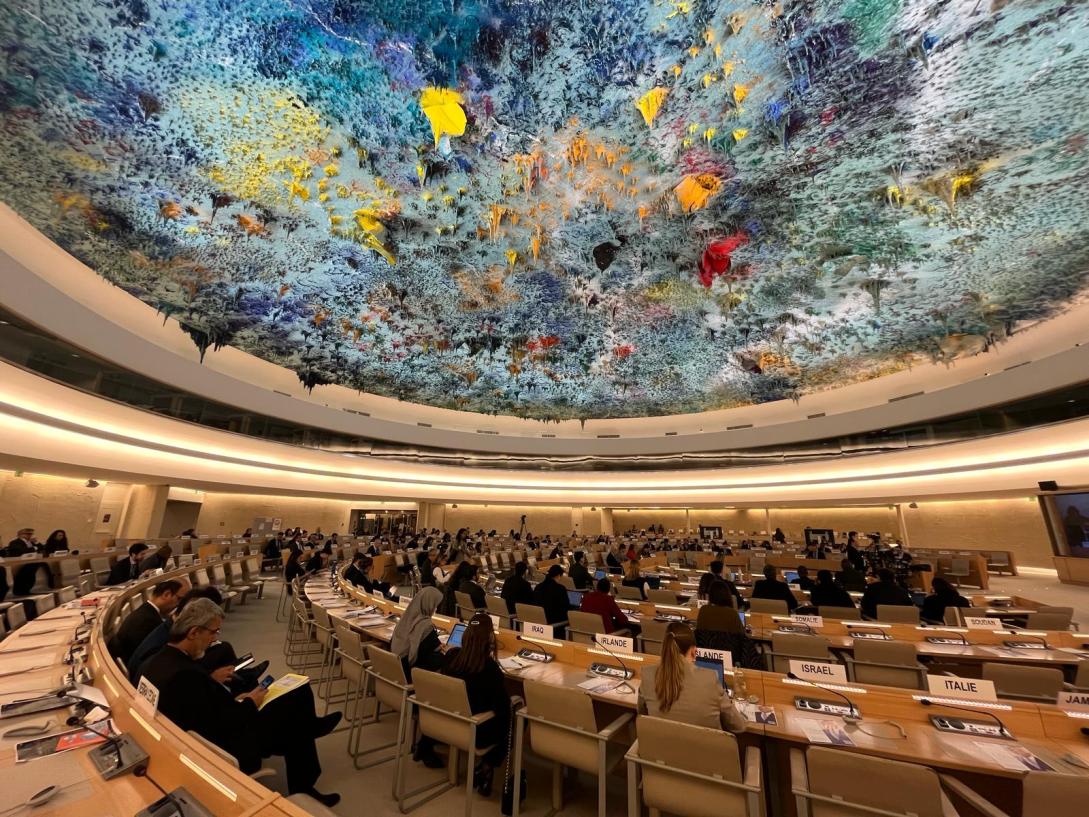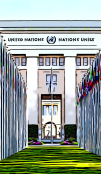EU at the Human Rights Council

“Two years ago, Russia launched its war of aggression against Ukraine. Now we are witnessing a true humanitarian catastrophe in the Middle East. Human rights are always the first casualty of war. We have witnessed it many times and we are seeing it now again in Ukraine and, in the most tragic proportions, in Gaza, following the terrorist attack perpetrated by Hamas on the 7th of October and the massive response of the Israeli Defence Forces, ” he said.
“This Council is an essential forum for addressing war crimes and serious violations of international humanitarian law, wherever it happens. Unfortunately, many conflicts need our immediate attention, but our collective purpose must be to ensure the equal dignity and rights of every human being, everywhere.” – Josep Borrell, EU High Representative for Foreign Affairs and Security Policy
The world continues to be confronted with other dire human rights situations, such as in Russia, Afghanistan, Myanmar, DPRK, Iran, Belarus and Sudan. These are just a few of too many crises to highlight, and of course, they are happening alongside protracted situations of conflicts and instability, such as in Syria and Yemen.
The EU together with its Member States, also called ‘Team Europe’, led a number of resolutions and Joint Statements at this Council session, covering a wide array of country situations as well as thematic human rights issues.
The European Union presented five resolutions, which were adopted by the Council:
- A resolution on Belarus to address the gravely deteriorating situation on the ground, with systematic, widespread and gross human rights violations, including some that may amount to crimes against humanity. The latest report of the High Commissioner on the situation in Belarus, presented at this session, speaks for itself. It depicts a clear picture of “an organized, continuing and systematic campaign of violence, repression and punishment pursuant to or in furtherance of a policy to attack a civilian population”. The long list of gross violations of human rights and the conclusion that “crime against humanity of persecution may have been committed” is alarming. Given the severity and scale of reported human rights violations and the complete impunity in Belarus, robust investigations need to continue to ensure accountability and bring justice and reparations to victims. The resolution both establishes a group of three independent experts and renews the mandate of the Special Rapporteur.
- A resolution on North Korea/DPRK to draw attention to the deteriorating human rights and humanitarian situation in the DPRK and to express continued support for the work on accountability. This year marks the 10th anniversary of the COI’s landmark report and findings. The EU remains deeply concerned that, 10 years later, systematic, widespread, and gross human rights violations, some of which may amount to crimes against humanity, persist in the DPRK. The resolution renews the mandate of the Special Rapporteur and requests the OHCHR to take stock of the implementation of the COI’s recommendations in a comprehensive report, to be presented to the Human Rights Council in September of next year.
- The EU-led resolution on Myanmar to address the deeply concerning and deteriorating human rights situation in the country. The Myanmar military continues to inflict unbearable levels of suffering and cruelty on people in Myanmar. Intensified conflict, transnational crime and mandatory conscription are now pushing Myanmar further down the spiral, while horrific and systematic human rights violations persist. The Myanmar military’s stranglehold on humanitarian assistance exacerbates the consequences of the crisis. This resolution is the Council’s answer to the High Commissioner’s call to the International community to refocus its energy on preventing atrocities against all people in the country, including the Rohingya, notably by taking meaningful, effective and targeted action to end the military’s access to arms, jet fuel and foreign currency that it needs to sustain its campaign of repression against civilians. It renews the mandate of the Special Rapporteur for one year and expresses continued support for accountability processes, including the Independent Investigative Mechanism on Myanmar as set up by the Human Rights Council. The adoption of the resolution by consensus by this Council sends a strong signal of support to the aspirations of the people of Myanmar for effective human rights protection, accountability, democracy and a civilian government.
- The EU also presented again a resolution on Freedom of Religion or Belief. The purpose of this resolution is to stress the importance of promoting and protecting the right to freedom of religion or belief. The resolution also strongly condemns all forms of intolerance and discrimination based on religion or belief against individuals, and denounces any advocacy of religious hatred, both online and offline, perpetrated by anyone anywhere. The right to freedom of thought, conscience, religion or belief is a universal human right to be exercised by every human being either individually or in community with others and in public or private, regardless of who they are, where they live, and what they believe or do not believe in. Yet, around the world individuals continue to be discriminated, and in some cases even persecuted and killed because of their religion or belief - or the lack thereof. The European Union stands ready to revitalise existing processes such as the Istanbul Process, and will continue to work on the basis of the Rabat Plan of Action, taking into account the Beirut Declaration and the “Faith for Rights” framework, essential tools designed to help states tackle religious intolerance in a human rights-compliant manner, which the international community should continue to foster and implement.
- The EU was pleased to partner once again with the Latin American and Caribbean Group (GRULAC) on the biannual resolution on the Rights of the child, which focused this year on the inclusive social protection. Today, social protection remains beyond reach of over 1.77 billion children globally, despite clear evidence that social protection has a profound positive impact on children’s lives. The resolution stresses that all children have the right to social security and recognizes the obligations of States to ensure access to inclusive social protection, which may positively promote a vast range of the rights of the child. The resolution highlights the importance of child rights mainstreaming across the United Nations system, calling for child-friendly modalities for children's participation and promoting children’s right to be heard.
Furthermore, the EU led a joint statement on the death of Alexei Navalny and the situation of the political opposition and human rights defenders in Russia.
The EU also led a joint statement on the importance of transitional justice and accountability in Ethiopia.
The EU actively participated in the debates of the Human Rights Council, including on Ukraine, the occupied Palestinian territory, Iran, Sudan, Eritrea, Venezuela, Mali, South Sudan, Syria, Afghanistan. We also addressed racial discrimination, the right to a clean, healthy and sustainable environment, the rights of persons with disabilities, the protection of human rights defenders, countering violence against children and religious hatred.
In a #TeamEurope approach, EU Member States presented, with partner countries, the following initiatives at HRC55 (non-exhaustive list):
- Joint statement on International Women’s Day (Finland, Mexico)
- Joint statement on elections in 2024 in the world (Romania)
- Joint statement on CEDAW 45 (Belgium, Albania, Côte d’Ivoire, Dominican Republic, Kirghizstan)
- Joint statement on ICJ Syria Provisional Measures (Netherlands, Canada)
- Resolution on the rights of persons belonging to minorities (Austria, Slovenia, Mexico)
- Resolution on the right to work (Greece, Romania, Egypt, Indonesia, Mexico)
- Resolution on adequate housing as a component of the right to an adequate standard of living, and the right to non-discrimination in this context (Finland, Germany, Brazil and Namibia)
- Resolution on “Torture and other cruel, inhuman or degrading treatment or punishment” (Denmark)
- Resolution on Combating Violence, Discrimination and Harmful Practices against Intersex Persons (Finland, Australia, Chile, South Africa)
- Renewal of the mandate of the Special Rapporteur (SR) on the situation of Human Rights in Iran and of the mandate of the Fact Finding Mission (FFM) (Germany, Iceland, United Kingdom, North Macedonia and the Republic of Moldova)
- Situation of human rights in the Syrian Arab Republic (France, Germany, Italy, Netherlands, UK, US, Qatar, Türkiye)
- Resolution on human right to a clean, healthy and sustainable environment (Slovenia, Costa Rica, Maldives, Morocco and Switzerland)
- Resolution on the role of States in countering the negative impact of disinformation on the enjoyment and realization of human rights (Latvia, Lithuania, Poland, Ukraine, Japan, United Kingdom, United States).
- Renewal of the mandate of the Special Rapporteur on the right to privacy (Austria, Brazil, Germany, Liechtenstein, Mexico)
- Rights of persons belonging to minorities (Austria, Slovenia, Mexico)





